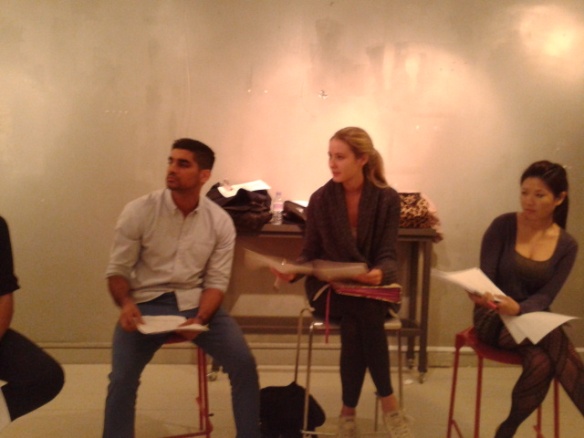Jingan Young is a playwright originally from Hong Kong and a King’s alumna (BA in English with Film Studies Class of 2012). She is the first playwright to be commissioned in English by the 42nd Hong Kong Arts Festival to be performed in March 2014.
She was a member of The Royal Court Theatre’s Young Writer’s Programme and has won bursaries from BAFTA, BBC and ScriptFactory UK. Her plays have been performed at The Hampstead Theatre Downstairs, Jacksons Lane, Oxide Student Radio & The Keble O’Reilly Theatre. She is currently adapting Alex Preston’s first novel “This Bleeding City” for the stage and her production company’s first full production “THE T-GROUP” will run during the 2013 Arts & Humanities Festival October 13-23rd in the Anatomy Theatre & Museum.
“There is nothing so practical as a good theory” – Kurt Lewin, 1951
Incidentally the narrative of my play does not run along the lines of “the story of a league of middle-class clerics who meet every fortnight to discuss the benefits of rooibus tea leaves beneath the Harvest Moon.” The “T” stands for “training”. In 1946, med-school dropout, Polish immigrant and social behavioural theorist Kurt Lewin (b. 1890) drew upon Gestalt psychotherapy (uhuh) in order to provide a “new and improved” version he proclaimed “field theory” which, in a nutshell, denotes behaviour as interdependent to the individuals and their surroundings. Got that? He also came up with the rather fabulous three phase change management model:
Unfreeze – transition – freeze
Throw in some map-making and according to Lewin you can predict, facilitate or manipulate bad or good behaviour, holding hands even. If you wish to delve further into the methodological waters of decision-making here is a rather thorough going albeit long-winded summary of his theories…or wikipedia-it. Simple.
Then along came “Group Dynamics”. Lewin believed social skills within working environments could be changed through group therapy and would ultimately placate racial and religious prejudices rampant within modern society (OK, so far so good. Nobody wants to leave Joe Schmo by the water cooler). After WWII the Office of Naval Research helped him to set up The National Training Laboratories (NTL) to combat soldiers’ PTS. Think “The Man in the Grey Flannel Suit” but instead of Tom Rath’s inferiority/crisis of individuality Lewin supposed we all suffer from one big God complex and needed a slap in the wrist albeit given by one of the few dozen members of a group.
But why? Fear that behaviour within postwar society would spiral out of control? Sex, drugs and rock ‘n’ roll? The following activities (Lewin surmised) aimed to improve relations between co-workers: team building, basic skills development, these “activities” encouraged “open communication”. Sound familiar? Work day picnics that involve piggy back races and egg and spoon. Does that make you hate Linda from IT less?
Lets all play “how-to-be-a-human-being.”
Set in the near future, my play is a black comedy that follows a group of doctors; a surgeon, a OB/GY, a GP, a pharmacist (and a chiropractor) who after committing a crime are required to attend a sensitivity training course run by a supercilious opportunist with her own agenda they question and demand to be Its absurdist, unrelentingly harsh and I sincerely hope, controversial in its approach to depicting this profession.
Professor Max Saunders, who entertained and enlightened us in July during our second production in London, with a rather thought-provoking, scintillating (funny too) piece on Ford Madox Ford, asked whether or not we might be interested to do something for this year’s Kings’ Arts & Humanities festival – perhaps, he queried “the play we discussed over coffee in Chapters, about doctors and empathy”? The theme, after all, is “Being Human”.
I often get asked how this idea to combine “sensitivity training” and “medicine” into a play came about. The idea for the play was immediate (sort of). Enter childhood friend – he the aspiring doctor since the age of 11. Decades I watched him beaten, berated, bullied – his life a whirlwind of exams, routine checkups, cramming, copious copying, sleep-deprived, slow atrophy of…empathy. On the rare occasion he did appear after a gruelling forty-nine hour week in the Emergency Room, or where he is based now – Ob/Gyn – bearing witness to a relentless stream of life and death – he would, over a beer (or two) revel in telling me stories of his days and nights spent in hospital.
He adores the problem solving aspect of medicine, the why, the how – getting the diagnosis right, proving others wrong. His biggest issue as a doctor (more so then when he was a student) was in the not being able to cope with the patients who demanded more than just a jab and a prescription pad – but rather a “shoulder to cry on”.
Aren’t we sick people just so annoying?
Several revelations were had during a full read-through with the full cast, our director Pippa Howie and myself. We discovered that everyone has, in some way or another, a connection, a behavioural connection – an emotional connection – good, bad, ugly – with medicine. Holistic, scientific. The play asks the age-old question of whether we can ever truly understand one another and if we can’t, why should we? Should the “right” emotions in the “right” context be imposed upon us at all?
We all hope you’ll continue to read my posts here on the play’s development into production with performances on the 14th, 17th and 23rd of October at 8pm in the Anatomy Theatre & Museum . We are also very privileged to have several esteemed individuals on the post show Q&A on the 17th including Prof Genevra Richardson, Kate Bassett and Prof Brian Hurwitz.
Follow me on Twitter @jinganyoung
This is a POKFULAM RD PRODUCTIONS 薄扶林道© in collaboration with the KCL Arts & Humanities Festival 2013 Being Human
Purchase tickets for the production on the official KCL e-booking website here


